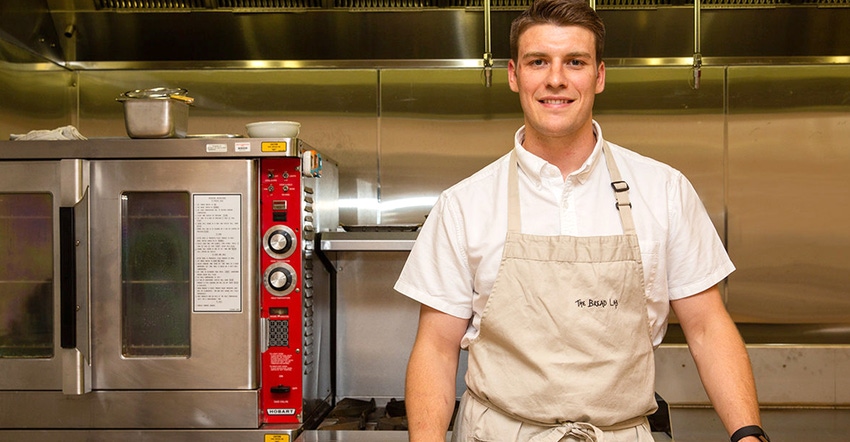December 19, 2018

One of the challenges facing farmers is keeping a strong connection to consumers. With changing consumer tastes and interests, that can be a challenge, but the first culinary director of The Bread Lab is working to pioneer foods and flavors that can make a difference.
The Bread Lab is Washington State University’s Burlington-based research center for bread and grains, and Niels Brisbane is working to link farmers and buyers. Brisbane came on staff earlier in 2018 and works to develop dishes that bring The Bread Lab discoveries and the products of the Pacific Northwest to the rest of the world. Said Brisbane: “People come hungry for knowledge. I help feed them.”
Brisbane, formerly sous chef at Seattle’s landmark Canlis restaurant, was a 2018 winner of Eater’s Young Guns award. He researches dishes that highlight WSU grains bred for Pacific Northwest farmers and chefs. He’s also helping connect the region’s culinary community with the farmers who grow the food.
Kim Binczewski, managing director, The Bread Lab, noted that Brisbane “broadens the reach of our work.” Grains are just part of the local agricultural and food economy, which the lab’s discoveries support — far beyond bread and beer. “Niels is here to help us showcase all of that variety to the greater Seattle community, as well as the farmers of Skagit and Whatcom counties [Washington].”
Brisbane’s role at the lab is funded by a gift from Canlis, where he worked for the last four years. He specialized in researching new menu items, and he connected with local farmers and artisans to create compelling new dishes. On a tour of the lab last summer, Brisbane got a look at the newly completed kitchen and listened to Stephen Jones, lab director, who told visiting chefs to “please come and use it.”
“It started my wheels turning,” Brisbane said. “The research that I’d been doing at Canlis is relevant to the entire food community. I saw The Bread Lab as a way to bring researchers and growers together with chefs to share ideas. I knew I needed to come here.
New foods, new flavors
Brisbane was recently working to make miso, a fermented product with origins dating back to ancient Japan. Yet the barley and beans fermenting in a heavy bucket in his kitchen lab were pure Skagit County, Wash.
Barley has less value than other cash crops, but regional growers rely on it as a rotational crop that breaks up weed and disease cycles. Brisbane’s miso is one of the way’s he’s finding new, valuable uses for barley, helping growers solve a challenge while giving chefs a new dish with an interesting Pacific Northwest spin.
Fermenting local barley with koji — a fussy mold that requires precise temperature and humidity, and frequent stirs — Brisbane presses the paste of local grains, beans and salt into buckets to age comfortably for months or years.
“Time does the rest,” Brisbane said. The end result is earthy, aromatic and slightly sweet. Brisbane suspects he may the only chef in Washington state crafting his own miso.
Another example of his work is a bottle of experimental maraschino cherries. Local Black Republican cherry trees produce fruit that’s too small to sell commercially, yet the trees are used to pollinate the popular Bing and Rainier cherry varieties. “I want to find better ways to preserve its fruit,” Brisbane said, and this product would give cocktail and desert makers a tiny purple topper.
As Brisbane explained: “We’re taking our new discoveries and forgotten products from Northwest farms and orchards, and turning them into valuable, premium foods with a story to tell. The WSU Bread Lab is showing what can be done when people blend their ideas and vision.”
Source: Washington State University
You May Also Like




